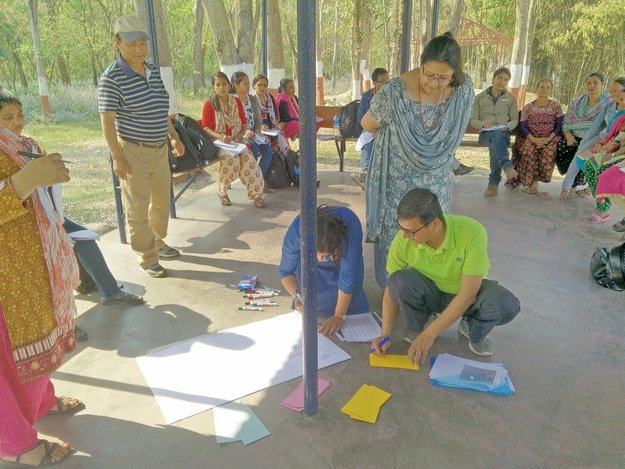
Mandira Singh Shrestha observers participants working on a poster during the session
Module two of the Certificate Programme in Climate Change was held in Bharatpur from 15-16 March 2017. The programme was organized by Chitwan District Coordination Committee (DCC) with technical support from Practical Action and ICIMOD. There were a total of 20 participants same as in module one from various government organizations. This Certificate Programme is a part of the District’s 2073 – 2074 annual programme. The purpose of the programme is to strengthen the capacity of the district level officials to better understand the changing context and the challenges of climate change. It is to enhance the abilities of the district officials to understand the tools and methodologies for climate change and disaster risk assessment and to apply it into the local planning and implementation process.
The second module on natural hazards and disaster risk reduction familiarized the participants with the concepts of hazard, risk and vulnerabilities and the various DRR frameworks at global, national and local levels. During the field visit to Kavreghat area in Bharatpur Municipality the participants had the opportunity to interact with the local communities and apply the tools and methodologies for hazard mapping as part of community based disaster risk reduction. The participants also observed the structural and non structural measures of flood risk reduction being implemented in Kavreghat which lies on the banks of Narayani river having high risk of flood hazard. The participants appreciated the introduction to GIS methods and remote sensing analysis with applications to climate change adaptation planning and the hands on exercise. Seeing the applicability and usefulness the participants have requested for a longer duration GIS training.
The certificate programme is part of the Himalayan Adaptation, Water and Resilience (HI-AWARE) regional programme of ICIMOD, which aims to increase climate resilience and adaptive capacities of the poor and vulnerable women, men, and children living in the Indus, Ganges, and Brahmaputra river basins. The programmes seeks to influence policy and practice by using the findings from research and pilot interventions to improve the livelihoods of people. HI-AWARE plans to extend this certificate programme to other areas in Gandaki basin after the Chitwan programme concludes. The third module of the certificate program will include the course on gendered vulnerability and climate change. Three more modules will be administered to the participants as a part of the certificate program.
